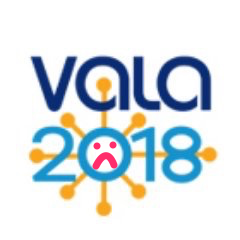This week, I’ve been wrested from the safety of my office workspace, surrounded by trolleys and paperwork, and thrust into the bustling atmosphere of a law library reference desk. It’s the start of semester so there are new students everywhere, wanting to know where the loos are, how they can find short-loan textbooks, and why the printers aren’t working.
I’m no stranger to reference, but I am a stranger to law students. I have a rudimentary understanding of Australia’s legal system, but I couldn’t use LexisNexis properly if you paid me. And people are paying me. I borrowed an old copy of the first-year intro to law textbook and a legal research guide, hoping I might learn enough to be useful while on the desk, but I know it won’t be enough. I also don’t know anything about fixing printer problems, and we had a lot of those today.
Now, I know I wasn’t hired to be a law reference librarian. If asked, I wouldn’t describe myself as a law librarian at all. I’m a cataloguer working in a law library. My strengths and interests lie elsewhere. I’ve also only been in this position for less than three months—I can’t possibly be expected to know all this stuff.
But it doesn’t help when someone comes to the desk and asks a question I can’t answer.
I wondered today whether ‘reference anxiety’ was a thing. Whether I might add it to my burgeoning collection of anxieties. I have anxiety. I’ve had it for years. It’s been exacerbated recently by a succession of personal problems—I can’t help but bring it to work.
Turns out reference anxiety is very real. A 2010 article1 [non-OA] by Adam Bennington in Searcher examined the causes of reference anxiety and its effect on librarians, along with some tips on when to cut your losses and accept an incomplete or unsatisfactory answer.
It still hurts, though.
You are the information professional after all, the expert searcher, the experienced librarian, the ultimate information broker. People come to you because Google couldn’t cut it. Not only do you want to help, but you want to help legitimize the profession by showing the client you can find anything.
When the searcher can’t uncover the answer, feelings of guilt, shame, and doubt in his or her professional worth can grow acute, especially in newly minted information professionals.
Don’t I know it.
If someone comes to the desk with a circ query, or a catalogue query, or a ‘where are the loos’ query, I know I can handle those, and my confidence is obvious. On the flipside, if someone asks me about finding cases, or choosing the right book for their essay question, or even how to fix the damn printers, I freeze. Not only can I not help them, I don’t even know where to look. If all three reference librarians are unavailable, I’m out of luck. I could ask the reference seekers to send an email and ensure someone gets back to them, but people need their printing right now, and they don’t teach printer repair in library school.
My heart rate goes through the roof. I can’t breathe, suddenly. My brain is going in ever-tightening circles. I can’t help them. What the hell am I here for?
We speak often about people who become overwhelmed by libraries and librarians, and the resultant user anxiety that creates. We call it, reasonably enough, ‘library anxiety’. Librarians bend over backwards to alleviate the fears of users who aren’t used to asking questions of people, not the internet, and we strive to make the library a welcoming and productive place. But that necessitates a certain level of reference skill.
I don’t have that skill, and I know I’m not expected to, but I like working here, and I want to do right by our users, my colleagues and my boss. I want to make sure every patron leaves with something. Whether that’s a case citation, or an email address for further help, or the number for the IT helpdesk.
Managing my anxiety enough to get them that something remains a work in progress. But all I can do is try. Perhaps after I’m done with the first-year law textbook, I’ll pick up a printer manual as well.
- Bennington, A. (2010). A practical guide to coping with reference anxiety disorder. Searcher, 18(3), 22-25,54. Retrieved from https://search.proquest.com/docview/221110022 ↩
